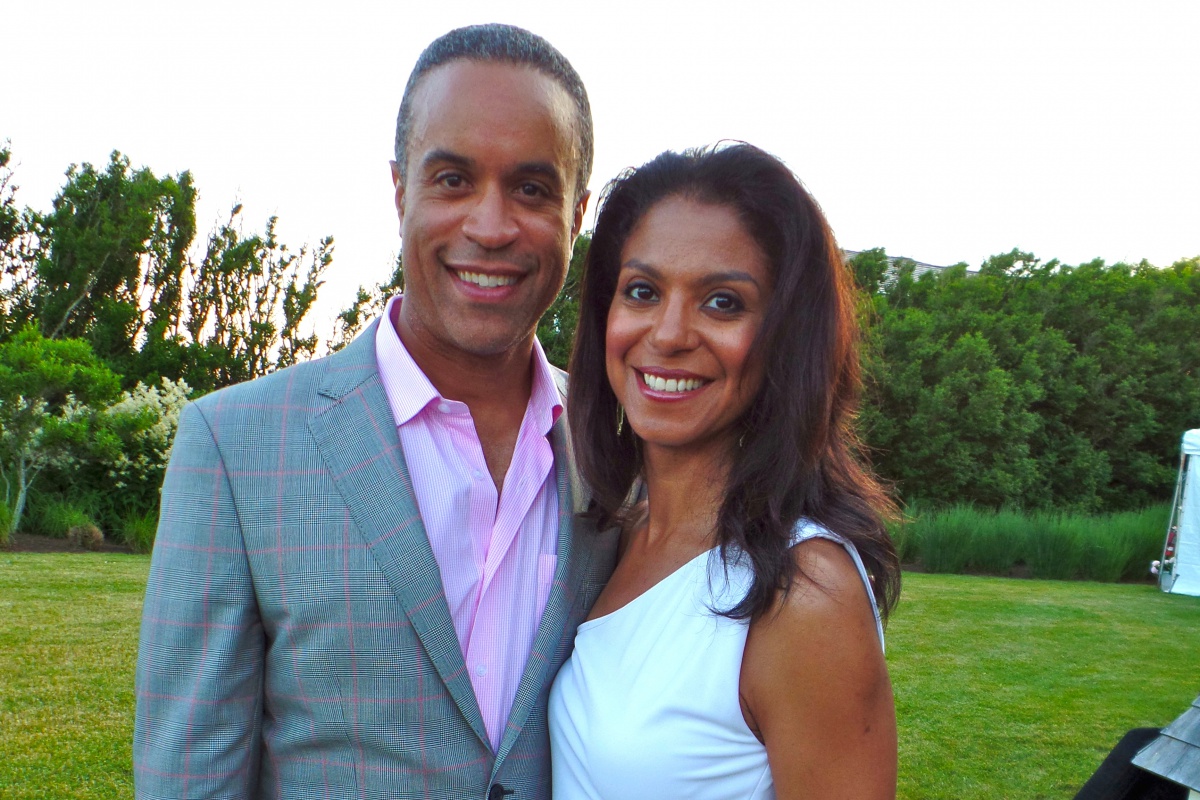Maurice DuBois smiled softly, his voice steady but his eyes betraying the emotion beneath. For years, viewers had known him as the calm, confident face of CBS Evening News, a man whose poise and measured tone could make even the most difficult headlines easier to bear. But this was different. There were no scripts, no teleprompters, no stories about politics or the economy—only his own. As he began to speak about his wife, Andrea, the steady professionalism that defined him gave way to something far more vulnerable. It was a rare moment when the mask of the newsroom anchor slipped, revealing the man behind it, raw and sincere.

He talked about Andrea not as a public figure’s wife, but as the quiet force that had anchored his life. “She never asked for attention,” he said softly, pausing between words as if each carried the weight of years. “She’s the reason I can do what I do, the reason I get up and face the world every day.” There was a gentleness in his tone, a reverence that seemed to fill the room. For so long, the spotlight had been his. Tonight, he turned it toward her.
Maurice described the way Andrea carried herself through the toughest times, with grace that didn’t need to announce itself. When he faced setbacks in his career or moments of personal doubt, she was always there—not with speeches or demands, but with quiet faith. “There were days I came home convinced I couldn’t keep doing this,” he admitted, his voice growing hushed. “And every single time, she would look at me, smile that same calm smile, and say, ‘You already know the answer. You’ve just forgotten it.’”
Those words, he said, became a kind of compass for him. When the world felt heavy, when the cameras turned off and the applause faded, Andrea’s voice brought him back to center. He recalled nights when he’d sit awake, replaying interviews in his head, second-guessing every question he’d asked, every choice he’d made. And she would simply take his hand, not needing to say a word. “It’s funny,” he said with a small laugh that trembled at the edges, “the person who knows the least about television is the one who’s taught me the most about life.”
As he spoke, the air in the room seemed to change. There was a stillness that came over everyone—colleagues, friends, even the cameramen who had seen him under every kind of pressure. They all leaned in, caught in the quiet honesty of his words. He told them how, during his recovery from a health scare that took him off the air years ago, Andrea became his strength. When he could barely lift his head, she was the one who lifted his spirit. When he was afraid the audience might forget him, she reminded him that the people who mattered most never would.

Maurice paused then, his eyes glistening under the studio lights. He drew a breath, one of those deep, deliberate breaths that seemed to carry both exhaustion and gratitude. “You don’t realize,” he continued, “how much someone loves you until you see them stand beside you in silence—when there’s nothing to say, nothing to prove, just presence.” The words hung there, gentle and unadorned, more powerful than any headline he had ever delivered.
He went on to recall a night not long ago when Andrea found him sitting alone in their living room after a particularly difficult broadcast. He’d just covered a story that shook him to his core—a tragedy that left him questioning the value of what he did. She didn’t ask him to explain. Instead, she placed a cup of tea in front of him, sat down beside him, and whispered, “You can carry the world for a few hours, but then you have to let it go.” He smiled faintly at the memory. “And I did,” he said. “Because she told me to.”
Then, just when it seemed his tribute had said it all, Maurice shared something that left everyone listening utterly still. In a trembling voice, he revealed that years ago, when he first fell ill and feared the worst, Andrea had quietly written letters to their two sons—one for each year he might miss if he didn’t recover. He never knew about them until much later, when she showed him a box filled with her words: notes of love, guidance, and faith for the boys to open every birthday, every milestone, every heartbreak. “She was preparing them for a life without me,” he said, tears now openly streaming down his face, “even as she refused to give up on me.”

The studio was silent. Not the professional silence of a broadcast pause, but the reverent stillness that comes when truth is spoken aloud. Maurice wiped his eyes, managing a small, grateful smile. “That’s who she is,” he said finally. “The strongest person I know. My story isn’t about me. It’s about her.”
When he finished, no one clapped. No one needed to. The moment itself was enough—a reminder that even the most composed among us carry stories too deep for news scripts, and that sometimes, the most powerful broadcasts are the ones that never make it to air.





